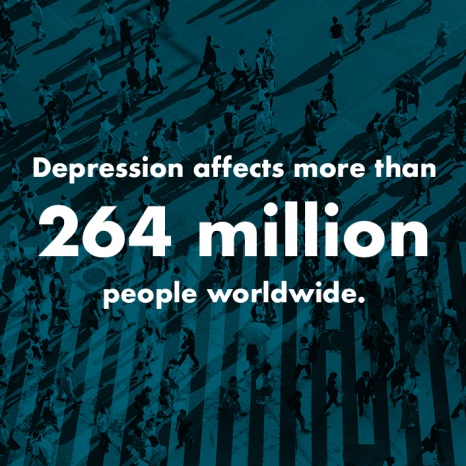Drug Misuse and Depression
Depression is a serious mood disorder. Also called Major Depressive Disorder or Clinical Depression, it is one of the most common mental disorders in the U.S. According to the World Health Organization, it affects more than 264 million people worldwide. Not limited to moods or “feeling down”, depression persistently impacts the day-to-day lives of the people who live with it. It can alter a person’s thoughts, perceptions, choices, and relationships in a negative way. Sometimes, it can make normal life and activities impossible. Often, people cope with depression through substance use and abuse. Drug misuse and depression are unfortunately common. Further, both issues are not always treated adequately.

SYMPTOMS
Not only can depression cause someone to perform poorly at work, school, and in social settings, it can also take a physical toll. It can lead to sleep problems, unhealthy weight loss or weight gain, chronic fatigue, unexplained physical pain, and trouble concentrating.
Outward symptoms can include:
- Anxiety
- Lethargy
- Irritability
- Outbursts of anger
- Stomach discomfort
- Loss of interest in relationships or normal activities
- Alcohol, drug, or prescription drug abuse
Major depression is an extremely serious, even life-threatening condition, but it is highly treatable. With professional help, many people recover or are able to manage their symptoms and lead a normal life. Unfortunately, many people are often to receive adequate treatment. Subsequently, drug misuse and depression become a common combination.
What Causes Depression?
Depression is a difficult web to untangle. Genetics, brain chemistry, hormones, and life circumstances can all play a part. It can develop at any stage in life, though it often emerges in young adulthood. It can run in families, and is more common in women than in men. While it sometimes connects with a certain event or period in someone’s life, most people can’t fully understand why they’re depressed (often there are many causes at once). Depression often occurs along with other mental disorders, and there are strong links between drug misuse and depression.
MountainView Recovery
5475 Mark Dabling Blvd #102
Colorado Springs, Co 80918
Contact Us Today!
MountainView Resources!
Types Of Depression
Major Depression
Depression is among the most common depression types. It is classified as debilitating or crippling depression when it leads to persistent feelings of hopelessness and severely impairs day-to-day life.
Persistent Depressive Disorder
Persistent Depressive disorder, or dysthymia, is less acute than major depression, but its symptoms last longer. Someone with persistent depressive disorder may experience sadness and hopeless feelings for years, while exhibiting listlessness and low energy.
High Functioning Depression
People with high functioning depression often hide their symptoms from the outside world. They can appear to be living a normal, happy life. Under the surface, they struggle with the same feelings of loneliness, hopelessness, and worthlessness that come with other depressive disorders. This disorder can go hand-in-hand with “imposter syndrome,” where a person feels like they don’t truly belong in their job or social circle. Constantly trying to hide these feelings is exhausting, and can even make them worse. In this situation, asking for help can be extremely difficult. If someone is able to hide their feelings well, even their friends and family may not be aware that there is a problem. Still, high-functioning depression is depression. It is worthy of concern and treatment, which can make a difference for the better.
Overcoming Depression
Overcoming depression is possible with the right treatment. However, it isn’t something anyone should try to get through on their own. It can be a recurring disease, and most people who suffer from depression don’t experience it just once. If you or someone you know is dealing with depression, it’s important to seek professional help.
Depression Treatments
Effective depression treatment is widely available, but many people don’t seek it. In 2017, the National Institute of Mental Health estimated that 17.3 million adults in the United States experienced at least one major depressive episode. Approximately 35% of these people did not receive treatment. This could be due to incorrect stigmas surrounding mental health or the assumption that a depressed person can just “snap out of it.” Without medical analysis, it’s difficult to compare an individual’s depression to anyone else’s. Additionally, the same treatments and drugs don’t work for everyone.

If you or someone around you is having thoughts of suicide or self-harm, call 911 or a suicide hotline immediately. Do not leave someone who is suicidal alone, and reach out for immediate help.
Three major types of depression treatment include:
- Psychotherapy or “Talk Therapy”
- Medication
- Brain Stimulation Therapy
There are many different kinds of medication and psychotherapy, and what works for one person may not work for another. If you’re taking an antidepressant, it’s important to be open and honest with your physician about how well it’s working.
Drug Misuse And Addiction
Depression is at the root of many substance abuse disorders, and substance abuse can cause severe depression. This means that depression and addiction often go hand in hand. When this happens, it’s important to treat the problems together in a specific way.
Don’t try to cope with depression on your own or self-treat with drugs or alcohol. This can feed into depression and create repeating, destructive cycles.
If you are struggling with drug misuse and depression, contact us today. It is our mission to compassionately empower every client who walks through the door of Mountain View Recovery Center. Our vision is to provide support and structure in a community-based, clinical setting using evidence based practices. Our purpose is to break the stigma of addiction and show our clients a united way to lifelong recovery.
FAQS
1. Why do I hate myself?
Self-loathing is one of depression’s most common symptoms. It doesn’t necessarily have any explanation or root in reality. Although nearly everyone goes through guilt and self-critical feelings at some point, depression can blow these normal experiences out of proportion and cause chronic low self-esteem. If you are dealing with self-hatred on any level, professional therapy can help.
2. Is depression a disability?
Some people can work through their depression, and others can’t. Crippling depression is a truly disabling condition, and one of the most common medical conditions listed on Social Security Disability applications. This doesn’t mean it has to be a life-long disability. With medication and therapy, most people with depression can manage or overcome it.
3. Why is it dangerous to “self-treat?”
There are things people can do on their own that may ease depression, including making healthy life changes and maintaining strong connections with family, friends, and spiritual or religious communities.
However, these external benefits don’t always make a difference for people with clinical depression. When someone turns to drugs or alcohol for self-treatment, they increase their risk for health problems, addiction, and worsened depression symptoms. Drug misuse and depression are complex issues. Everyone struggling with either one or both deserves proper treatment and care.
Mountain View Recovery Treatment Programs
Patient Resources
Addiction is complex, which means treatment and long-term recovery are complex. Despite this, it shouldn’t scare anyone – patients or their loved ones. It just means that treatment and recovery both require thorough and thoughtful planning.
Outpatient Program
Our outpatient program (OP) is a transition preparatory phase. It provides a minimum of nine (9) hours of weekly outpatient treatment. This involves a minimum of one (1) hour/s individual substance abuse/behavioral health counseling per week.
Adventure Therapy
For a long time, nature has been seen as a balm to the problems we face in society. Even during pre-industrial times, people would seek out the countryside as a means to feel better. Many people have also used nature as a way to understand the world.
Trauma and Recovery
Just like physical trauma occurs, so does psychological trauma. Any number of traumatizing events occur and cause psychological trauma. A lot of people will experience trauma before or because of addiction. It’s possible for addiction to deepen…
Neurofeedback
Nobody sets out with the intention of becoming addicted to anything. Even someone making a conscious decision to try substances is not intending to become dependent, experience withdrawal, and risk overdose or death. There are numerous factors.
